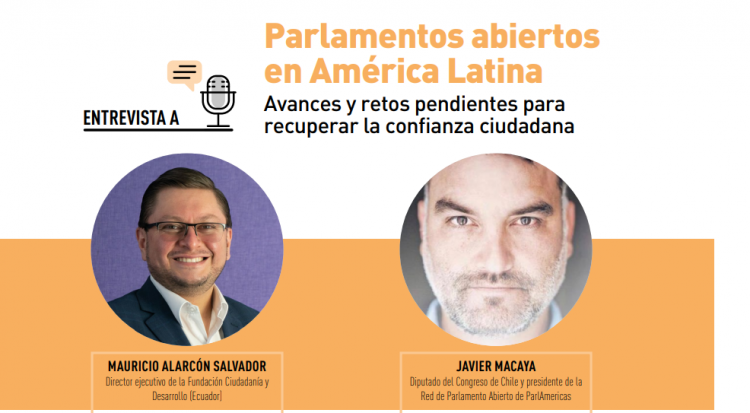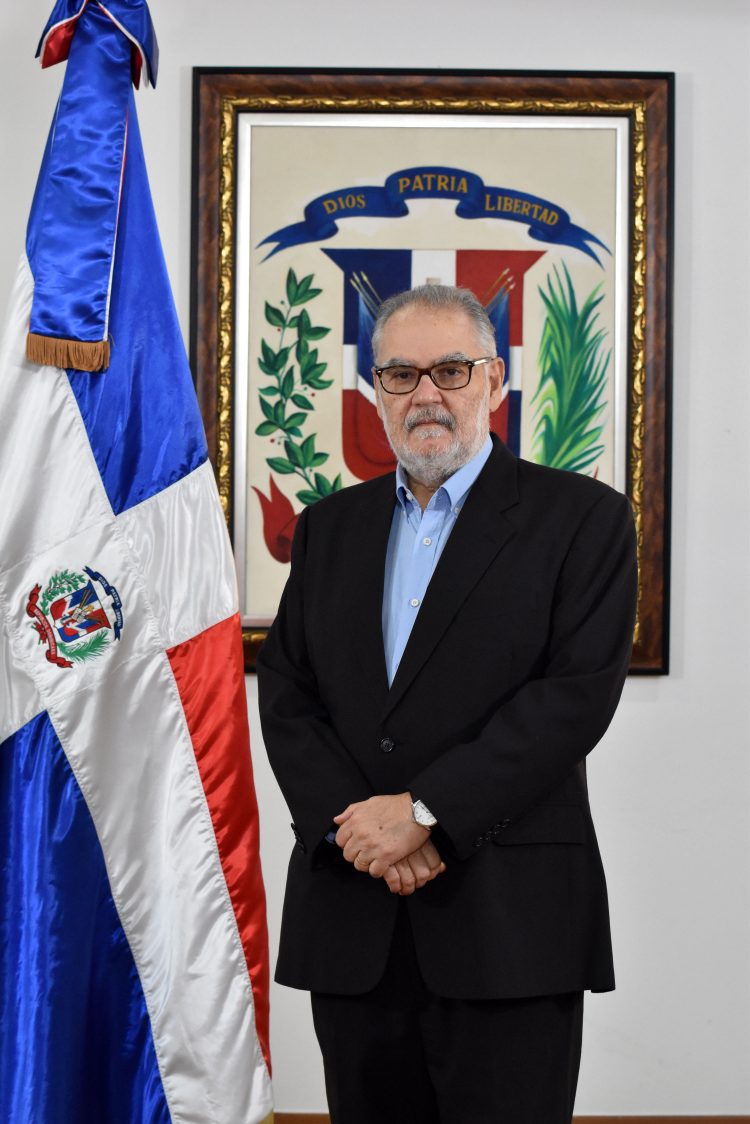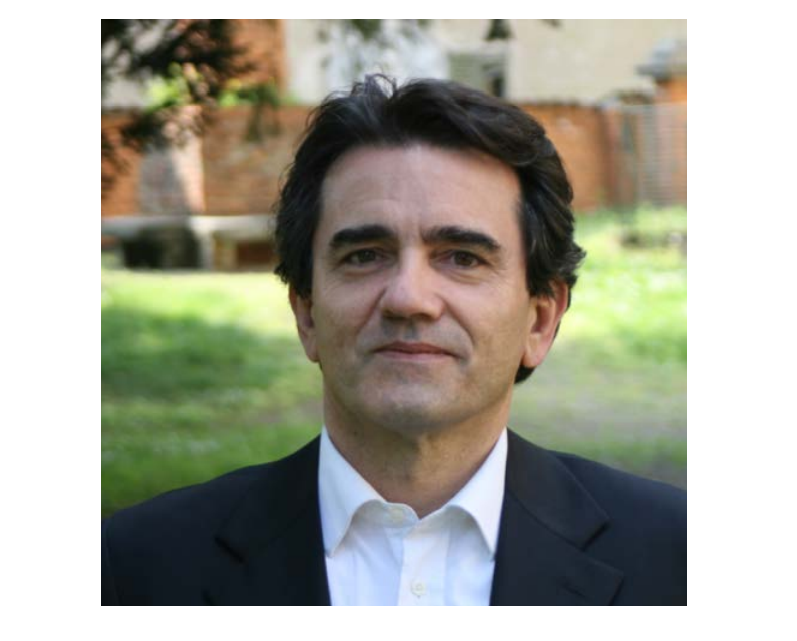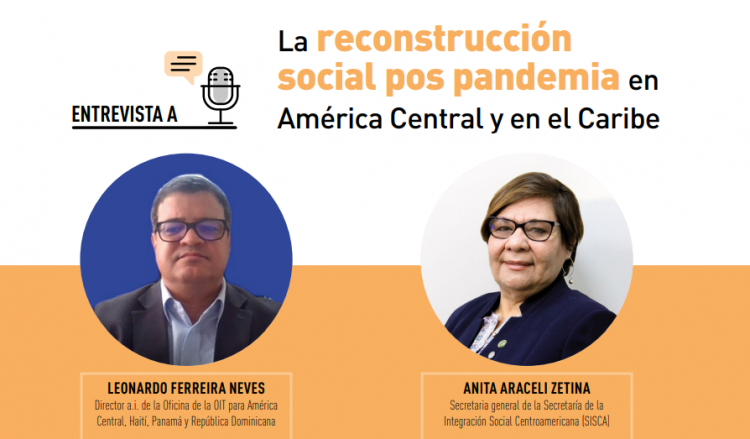We had a conversation with Mauricio Alarcón Salvador, executive director of the Citizenship and Development Foundation (Ecuador), coordinating organisation of the Latin American Network for Legislative Transparency (RLTL) , and with Javier Macaya, deputy of the Chilean Congress and chairman of Open Parliament Network of ParlAmericas , a body that brings together the national legislatures of 35 Latin American and Caribbean states. We talked about progress with and chal-lenges to the parliamentary opening processes in the region, within the framework of the sup-port that EUROsociAL+ provides to these initiatives.

By Borja Díaz Rivillas, Head of Good Governance in the EUROsociAL+ (FIIAP)
What are the main advances made in the area of parliamentary openness in Latin America? What challenges are still pending?
Javier Macaya: The progress made with this agenda in Latin America is significant and has positioned the region as a world leader in the field of open parliament. Several national parliaments have adopted action plans and initiatives to encourage legislative openness. Despite the pandemic, legislative powers such as those of Argentina, Brazil, Costa Rica, Chile, Ecuador or Paraguay, among others, have taken action to consolidate transparency, accountability, citizen participation and ethics in parliaments. The virtual open agendas promoted in the Argentina action plan, information standardisation of information and ease of use of parliamentary data in Brazil, the Integrity Systems of the National Congress of Chile, the inclusion of civil society organisations in the Costa Rica Parliament’s Open Government Commission, the open parliament regulation of Ecuador and the creation of key concepts of the SDG monitoring portal of Paraguay. The great value of these initiatives is their institutional nature, with political and civil service involvement, which will allow their sustainability over time.
Mauricio Alarcón: It is difficult to talk about regional progress when the evaluation of the 2020 Latin American Legislative Transparency Index shows a 19.3% drop in the regional average. Congresses and assemblies obtained 58.9% in 2018 and 39.6% in this last measurement, reflecting gaps that have not been closed in more than a decade. Chile and Costa Rica, the countries with the highest scores, are still far from the target standard, without significant progress, with just over 50% of the score. This may be due to the fact that citizen participation, the cornerstone of Open Parliament and the dimension with the highest weighting in the 2020 edition, is still deficient in terms of creating open parliament action plans, where the indicator obtains a score 36.5%, for example. There is no doubt that during this decade, congresses and assemblies made efforts to create action plans; however, they still face difficulties in terms of sustainability, collaboration, creation, independent evaluation and dissemination. It is important to note that the Index renewed, deepened and made its content more demanding; with the result that the ILTL 2020 is not fully comparable with previous editions. However, it provides a general indicator of regional averages with honest figures compared to previous editions. The challenges are enormous and reveal a complex situation. Regarding regulations, it is urgent to update or issue new rules on access to information, as well as regulation of lobbying and lobbies. Regarding budget and management, congresses and assemblies are indebted to the public in terms of transparency in the budget and administrative management. Information on civil servants engaged and legislators’ expenses should be permanently available. perhaps one of the greatest challenges, at a time when legislatures are losing credibility and trust, is to enable and strengthen spaces for citizen participation that connect constituents to the work of their representatives.
What is the impact of the Covid-19 pandemic on parliamentary opening processes in the region?
Javier Macaya: Undoubtedly, the pandemic has had an impact on the functioning of parliaments and enormous efforts have been required to adapt our work to a virtual environment. However, on the positive side, technological innovation advanced by several years. In this regard, the digital creation and implementation of action plans has forced parliamentarians, officials, civil society and citizens to make use of technology. It has also facilitated citizen participation by saving time and travel expenses and decentralising participation. However, the pandemic exposed a digital divide that limits citizen participation in rural areas that have poor connectivity and that of people who are not digital natives. That is why it is crucial to continue to use the advantages of communication and information technologies, to mainstream the use of the internet and digital education, the use of artificial intelligence in parliamentary processes and to close the digital gap, At the same time, regulations and institutions must be developed to protect personal data and global strategies devised reduce fake news and misinformation.
Mauricio Alarcón: These no question that the pandemic had a direct impact on legislative work at the regional level. The Ecuadorian Assembly, for example, immediately went virtual, while other legislative bodies took weeks and even months to reactivate. Therefore, there were some improvements, such as resilient parliaments that found technological, administrative and legal measures to adapt and to continue legislating and supervising, and some negative impacts, such as the difficulties for citizen control due to the restrictions imposed by the authorities.
EUROsociAL+ has collaborated with ParlAméricas and the Transparency and Access to Information Network (RTA)[1] to develop a Legislative Transparency Toolbox[2]. What is the relevance of this joint effort to systematise good practices?
Javier Macaya: Since we started establishing the principles of an open state in the parliaments of the region with the ParlAmericas Open Parliament Network (OPN), it has been clear to us that it is imperative to clarify and continue to facilitate spaces for inter-parliamentary exchange and good practices based on the Road Map towards Legislative Openness. In this regard, the tool kit is a valuable effort to promote one of the pillars of this roadmap, namely transparency and access to information. It is also a meeting point between legislative powers and information guarantor bodies, where generating synergies is key to further consolidating legislative openness. It also serves as a frame of reference for future open parliament undertakings. Finally, the fact of having included more than 100 of the region’s good practices makes this a very comprehensive document and facilitates the implementation of key considerations related to transparency.
Mauricio Alarcón: For several years, congresses and assemblies have been implementing changes regarding their transparency and openness. All experiences, positive or negative, offer us useful lessons. Therefore, making good practices systematic and available is a valuable collective learning exercise that can promote openness at the regional level. A toolbox like this, coupled with political will, can bring about important changes that benefit citizens.
On August 25, the fifth edition of the Latin American Legislative Transparency Index for 2020, was published. How would you assess the results?
Javier Macaya: The Legislative Transparency Index is an important tool in the region, because it shows us how we are doing and the indicators to which we must pay attention to improve the effective implementation of the four dimensions. The results of the most recent edition, whose methodology was change, with support from EUROsociAL+, show that we are on the right track, but we still have a long way to go, since only two legislative branches were given a “pass” mark in the Index. Numerous indicators that are reviewed and in the short term, we must make efforts in terms of budget data transparency and administrative management of parliament at the regional level. Likewise, we must continue working to institutionalise legislative openness and, thereby, achieve other levels of effectiveness and impact of this agenda by publishing data in different formats, visualisations and clear language. Open Parliament is here to stay and its benefits are in the national interest; the countries with the most experience in open parliament scored best in the Index. It remains for us to continue fostering spaces for active dialogue that consider the key actors in these processes: parliamentarians, government officials, and, of course, civil society and citizens.
Mauricio Alarcón: As some media have announced, parliamentary opening is poor in Latin America. In general, the results are not at all encouraging, even for the highest-scoring countries. As well as providing evidence, the ILTL has created a stage for debate and reflection, since it gives a clear view of the gaps in each country and the limited progress in recent years, while providing data that facilitate the possibility of improvement. We hope this is seen as a positive and constructive critical appraisal for enhanced parliamentary openness in the region. Along these lines, collaboration between civil society networks, networks of parliamentarians and international cooperation has meant the construction of a sustainable setting for Open Parliament promotion and technical assistance in the region. Proof of this is the fifth edition of the Latin American Legislative Transparency Index, the Road Map towards Legislative Openness and the Legislative Transparency Toolbox, which are certainly indispensable instruments.
[1] https://redrta.org/
[2] https://eurosocial.eu/wp-content/uploads/2020/10/Transparency_Access_SPA.pdf



